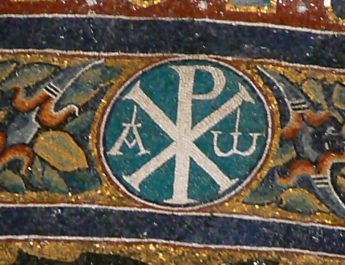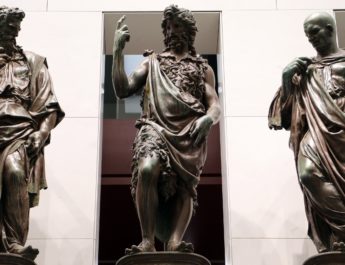BibleHub
1 O give thanksA to the Lord,B for he is good;C
Notes on verse 1a
A “give thanks” = yadah. From yad (hand). This is to throw one’s hands into the air in a gesture of praise. So, it is to praise, give thanks, or make a confession.
B “Lord” = YHVH. From havah (to be, become) or hayah (to come to pass, become, be). This is the name of the God of Israel, the self-existent and eternal one, the tetragrammaton. This pronunciation has been lost to time so “Lord” is generally used in its place.
C “good” = tob. From tob (to be pleasing, to be good). This is good, beautiful, pleasant, agreeable, bountiful, at ease. This word is used for goodness as a concept, a good thing, a good person. This can refer to prosperity and welfare as well as joy, kindness, sweetness, and graciousness. So, this is ethically good, but also enjoyably good.
his steadfast loveD endures forever!E
2 Let IsraelF say,
“GHis steadfast love endures forever.”
Notes on verses 1b-2
D “steadfast love” = chesed. From chasad (being good, kind, merciful; may mean bowing one’s neck as is done in the presence of an equal for courtesy’s sake; so, if one in a superior position is treating you like an equal, that is what is captured here). This is favor, goodness, kindness, loving kindness, pity, reproach, or a good deed. When done by God to humanity, this is mercy/loving kindness. When done by humanity to God, it is piety.
E “forever” = olam. This is a long scope of time whether in the past (antiquity, ancient time) or in the future (eternal, everlasting).
F “Israel” = Yisrael. From sarah (to persist, exert oneself, contend, persevere, wrestle, prevail) + el (God or god). This is Israel, meaning God strives or one who strives with God; new name for Jacob and for his offspring. This refers to the people and to the land.
G {untranslated} = na. This particle is used for requests or for urging. It can be we pray, now, I ask you, oh. This is the same “na” in “hosanna.”
19 OpenH to me the gatesI of righteousness,J
Notes on verse 19a
H “open” = patach. This is to open wide in a literal or figurative sense. So, it is open, draw out, let something go free, break forth. It can also mean to plow, engrave, or carve.
I “gates” = shaar. May be related to sha’ar (to calculate or reckon; may come from a root that means to open up or split). This is a gate, door, or other opening like a port.
J “righteousness” = tsedeq. This is rightness, righteousness, vindication. It is everything that is just or ethical. That which is right in a natural, moral, or legal sense. It also includes just weights (i.e. true weights). Figuratively, this is justice, righteousness, equity – even prosperity.
that I may enterK through them
and give thanks to the Lord.L
20 This is the gate of the Lord;M
the righteousN shall enter through it.
Notes on verses 19b-20
K “enter” = bo. This is to enter, come in, advance, fulfill, bring offerings, enter to worship, attack. It can also have a sexual connotation.
L “Lord” = Yah. Related to “Lord” in v1. From YHVH (see note B above). This is Lord or God – a shortened form of God’s most holy name.
M “Lord” = YHVH. Same as “Lord” in v1. See note B above.
N “righteous” = tsaddiq. Related to “righteousness” in v19. From the same as tsedeq (see note J above). This is just, innocent, righteous, righteous one, or lawful.
21 I thank you that you have answeredO me
and have becomeP my salvation.Q
Notes on verse 21
O “answered” = anah. This is answer, respond, announce, sing, shout, or testify. It means to pay attention, which implies responding and, by extension, starting to talk. Used in a specific sense for singing, shouting, testifying, etc.
P “become” = hayah. Related to “Lord” in v1 & “Lord” in v19. See note B above.
Q “salvation” = yeshuah. From yasha (to deliver, defend, help, preserve, rescue, be safe. Properly, to be open, wide or free, which implies being safe. Used causatively, it means to free). This is salvation, deliverance, health, victory, prosperity.
22 The stoneR that the buildersS rejectedT
has become the chiefU cornerstone.V
Notes on verse 22
R “stone” = eben. This is a stone, weight, or mason. It is part of the word “Ebenezer.”
S “builders” = banah. This is to build, make, set up, restore, repair, or obtain children. It is to build literally or figuratively.
T “rejected” = ma’as. This is to reject, refuse, despise, disdain, reject, or spurn. It can also be to disappear or melt away.
U “chief” = rosh. This may come a word that means to shake. It is the head, captain, or chief. It can also be excellent or the forefront. It can be first in position or in statue or in time (i.e. the beginning).
V “cornerstone” = pinnah. Perhaps from pen (corner, angle, street, wall). This is an angle, corner, cornerstone, tower, bulwark, pinnacle. Figuratively, it can be a chieftan.
23 This is the Lord’sW doing;
it is marvelousX in our eyes.Y
Notes on verse 23
W “Lord’s” = YHVH. Same as “Lord” in v1. See note B above.
X “marvelous” = pala. From pele (wonder, miracle, wonderful, marvelous thing). This is to be extraordinary, to arise, to be great or accomplish.
Y “eyes” = ayin. This is eye in a literal or figurative sense so eye, appearance, favor, or a fountain (the eye of the landscape).
24 This is the dayZ that the LordAA has made;BB
let us rejoiceCC and be gladDD in it.
Notes on verse 24
Z “day” = yom. Root may mean being hot. This is the day in a literal or figurative sense. It can also mean birth, age, daylight, continually or other references to time.
AA “Lord” = YHVH. Same as “Lord” in v1. See note B above.
BB “made” = asah. This is to make, do, act, appoint, become in many senses.
CC “rejoice” = gil. Properly, this is twirling around because of a strong feeling whether of rejoicing or from fear. This can be rejoice, be glad or joyful, or to cry.
DD “be glad” = samach. This is to rejoice or be glad. Properly, it is to brighten up in a literal or figurative sense.
25 SaveEE us,FF we beseechGG you, O Lord!HH
Notes on verse 25a
EE “save” = yasha. Related to “salvation” in v21. See note Q above.
FF {untranslated} = na. Same as {untranslated} in v2. See note G above.
GG “beseech” = annah. Related to {untranslated} in v2. 13x in OT– 4x for beg, beseech, entreat; 9x for Alas, O, Ah. Perhaps from ahabah (love); {from aheb (to love, beloved, friend; to have affection for sexually or otherwise)} + na (see note G above). This word is oh, I ask you, now.
HH “Lord” = YHVH. Same as “Lord” in v1. See note B above.
O Lord,II we beseech you, give us success!JJ, KK
Notes on verse 25b
II “Lord” = YHVH. Same as “Lord” in v1. See note B above.
JJ “give…success” = tsalach. This is pushing forward in a literal or figurative sense. So it could be to break out, to come mightily, to rush, to go over. Figuratively, it could mean to prosper.
KK {untranslated} = na. Same as {untranslated} in v2. See note G above.
26 Blessed isLL the one who comesMM in the nameNN of the Lord.OO
We bless you from the housePP of the Lord.QQ
Notes on verse 26
LL “blessed is” = barak. This is to kneel, to bless. It is blessing God as part of worship and adoration or blessing humans to help them. It can be used as a euphemism to say curse God.
MM “comes” = bo. Same as “enter” in v19. See note K above.
NN “name” = shem. May be from sum (to put, place, set). This is name, fame, renown. A name was thought to indicate something essential about a person – something about their individuality. So, this word can also mean honor, authority, or character.
OO “Lord” = YHVH. Same as “Lord” in v1. See note B above.
PP “house” = bayit. Related to “builders” in v22. Probably from banah (see note S above). This is house, court, family, palace, temple.
QQ “Lord” = YHVH. Same as “Lord” in v1. See note B above.
27 The LordRR is God,SS
and he has given us light.TT
Notes on verse 27a
RR “Lord” = YHVH. Same as “Lord” in v1. See note B above.
SS “God” = El. Related to “Israel” in v2. See note F above.
TT “light” = or. From or (to be or become light). This is light, sun, sunshine, dawn, or daylight. Figuratively, it can refer to light from instruction, light of a face (that is to say one that is cheerful or finds favor). It can refer to prosperity or salvation; a light that guides, a light eternal from Zion.
BindUU the festal processionVV with branches,WW
up to the hornsXX of the altar.YY
Notes on verse 27b
UU “bind” = asar. This is to tie, yoke, bind, or fasten. It can mean to harness an animal, to join in fighting a battle, or to imprison someone.
VV “festal procession” = chag. From chagag (feast, celebrating a festival, making a pilgrimage; properly, going in a circle or marching in sacred procession; implies giddiness and dancing; reeling to and fro). This is a feast, a sacrifice as part of a festival, or the gathering of the festival.
WW “branches” = aboth. From abath (to weave, wind, or interlace). This is a cord, string, band, wreath, branch, or foliage.
XX “horns” = qeren. This is horn or hill. It can be a flask or cornet, ivory, altar corner, mountain peak, or figuratively power.
YY “altar” = mizbeach. From zabach (to kill, slay, offer; slaughtering an animal to offer as a sacrifice). This is an altar.
28 You are my God, and I will give thanks to you;
you are my God,ZZ I will extolAAA you.
29 O give thanks to the Lord,BBB for he is good,
for his steadfast love endures forever.
Notes on verses 28-29
ZZ “God” = Elohim. Related to “Israel” in v2 & “God” in v27. See note F above.
AAA “extol” = rum. This is to rise or raise, to be high literally or figuratively. So it can also mean to exalt or extol.
BBB “Lord” = YHVH. Same as “Lord” in v1. See note B above.
Image credit: “Palm Branches” by Luke Jones, 2014.




